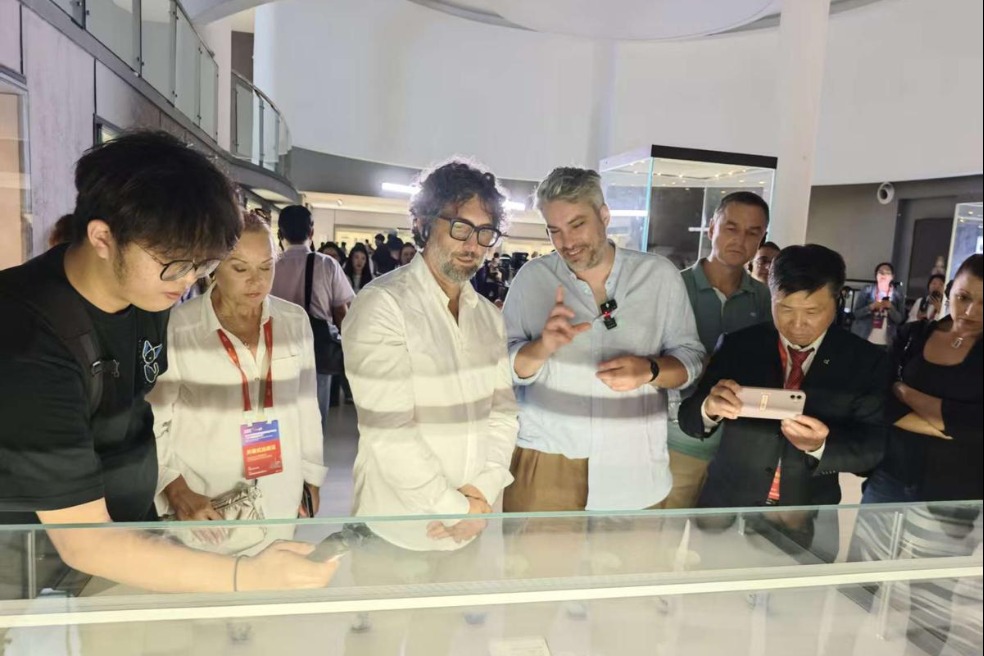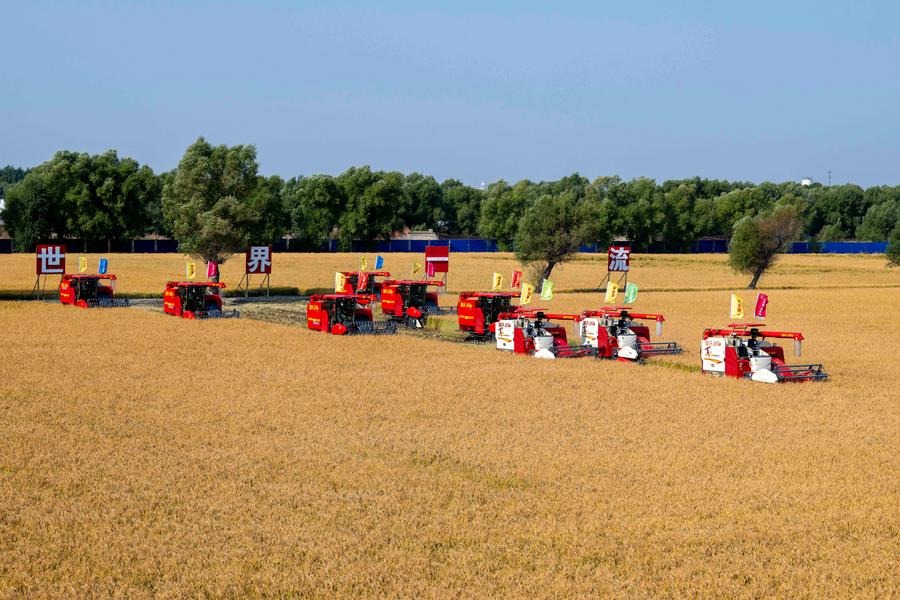City's campuses balance digital, real-world study

Beijing No 80 High School has pioneered the introduction of artificial intelligence-driven courses in the city, exceeding the educational requirements set by authorities for this academic year.
Last year, the school was designated a National-level AI Key Education Base by the Ministry of Education, and it has since made significant advancements in the field.
The school began its exploration of AI education even before the city issued guidelines to incorporate AI into the general curriculum across some 1,400 primary and secondary schools, impacting about 1.83 million students this year.
Ren Weidong, principal of the Beijing No 80 High School education group, which spans primary to high school education, said, "Local schools should establish an educational framework for AI-driven reform and bring in expert groups to strengthen the courses."
In line with this strategy, the school invited Song Ruihua, dean of the Gaoling School of AI at Renmin University of China, to deliver the first class of the new semester on Sept 4.
Shi Yan, director of the curriculum management department at Beijing No 80 High School, said, "Creating diverse educational scenarios, particularly those that foster teacher-student collaboration, is crucial for advancing educational innovation and reform driven by AI."
Under the guidance of Jia Zhiyong, an information technology teacher, in April, students developed a database and a keyword-sorting AI program for an education conference co-hosted by the school and the China Computer Federation.
"Participants could scan a QR code, ask questions and receive immediate answers. This is part of our practical approach to AI in educational settings," Jia said.
Shi also guided teachers in developing an intelligent agent to answer students' questions when teachers are unavailable.
"Our efforts aim to achieve precision in instructional design, intelligence in teaching processes, personalization in student learning, and scientific rigor in learning assessment," Shi said. "By catering to each student's unique needs, we can improve teaching quality and enhance learning outcomes."
Beyond AI, but with AI as a key element, the school group has launched robotics courses from junior to senior high school.
At the World Robot Conference in Beijing in August, the World Robot Contest Championship was a highlight, with the school's education group winning the junior-high division and taking the runner-up position in the senior-high division.
The teams also participated in the closing ceremony of the World Humanoid Robot Games in Beijing, showcasing local students' capabilities in the field.
Zhang Peng, a teacher in the school's robotics team, said: "The training has enhanced their skills in robot assembly, practice and operation, as well as their AI and algorithm capabilities. I hope these experiences will guide their choices in university majors."
He said that robotics training begins in primary school, with students selected based on their interests and enthusiasm, allowing them to join robotics clubs across different schools.
Student Wu Yaoduo, said, "I love the training; it has improved my thinking processes and provided a unique perspective beyond regular classes."
Fellow student Yang Hanbo expressed his strong determination to pursue a major in this field, saying, "Our team has a solid foundation in software, automated programming and AI majors."
Student engagement
To ensure the effective implementation of the curriculum, Beijing has made efforts to support local schools with software resources and teacher training.
The first batch of 160 city-level curriculum resources was issued on Aug 22, covering all grade levels, according to the Beijing Municipal Education Commission.
Each set includes a core teaching video of about 15 minutes, a teaching guide and activity task sheets.
The teaching implementation follows the cognitive development of students. At the primary school stage, the focus is on experiential courses, using everyday scenarios like image recognition and interactive games to spark interest.
At the middle school stage, the emphasis shifts to cognitive teaching, guiding students to experience model training and use generative AI tools to enhance their learning and daily lives.
At the high school stage, the focus is on comprehensive practice and cultivating skills in data processing, algorithm application and interdisciplinary innovation.
Across all stages, there is a strong emphasis on ethics education, guiding students to embrace the value of "technology for good".
Gong Ke, president of the Chinese Institute of New Generation Artificial Intelligence Development Strategies and former president of Nankai University, said that while it is important to introduce courses on intelligent technologies, the approach should not be limited to simply adding one or two specialized courses.
"We need to teach and learn both the general and specialized knowledge related to AI systems, and cultivate the digital literacy of the new generation. This includes integrating ethical consciousness and considerations, digital mindsets, digital learning capability and digital application skill," he said.
The goal is to achieve an overarching integration of intelligence into the current teaching system, Gong said.
He also advocated for "learning by doing", which should not be about memorizing rigid rules or some knowledge points, but rather about creating a digital campus and classrooms that blend the real and virtual worlds.
Gong emphasized prioritizing moral development in education.
"The fundamental aspect of the healthy development of intelligent systems lies in human talent," he said. "The quality of talent determines the quality of AI; it is human input that makes AI truly effective, safe and fair. We also rely on human intervention to ensure that AI is compassionate and benevolent, and we must instill a moral compass in AI. It is essential for people to cultivate the right intentions for AI."
yangcheng@chinadaily.com.cn
- City's campuses balance digital, real-world study
- Plan fast-tracks HK's development
- Beijing makes AI education compulsory in public schools
- Beijing hospitals to gain faster access to novel drugs under new measures
- Typhoon, cold front to bring wet, windy weather
- China OKs world's first functional cure for hepatitis B




































